When you buy through our links, we may earn a commission. Products or services may be offered by an affiliated entity. Learn more.
Best Sheets of 2024
Expert Tested & Sleeper Approved
There are generally two camps when it comes to sheets: People who fixate on things like texture, breathability, and weave, and those who’ve owned the same set of sheets for the last 10 years but couldn’t name them if they tried.
For those of us who fall somewhere between the two extremes, what makes a sheet set “best” comes down to a few basic questions: Are they comfortable? Do they look nice? How much are they? Will they hold up? Check out our testing team’s top picks below. We’ve personally evaluated all of these based on factors like cooling and overall feel.
What Are The Best Sheets of 2024?
With the huge variety of products on the market today, we recommend taking your feel and temperature preferences into account while shopping for a new sheet set. The Saatva Organic Sateen Sheet Set earned our top pick thanks to their temperature-regulating construction and smooth feel, which should appeal to many sleeper types.
I’ll get to our recommendations in a second, but I first wanted to clue you in on what exactly it is that you’re buying. Is a 2,400 thread count sheet going to outsleep a 200 thread count sheet? Is Egyptian cotton grown in Egypt? Are those bamboo and eucalyptus sheets actually made from plants? Scroll past our product picks or hit the jump links below to find out.
Top Sheets of 2024
-
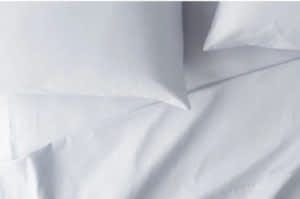
Best Overall
Saatva Organic Sateen Sheet Set
Shop Now
-
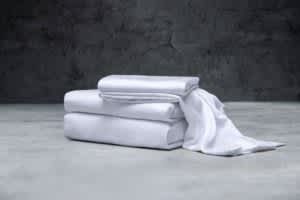
Best Cooling
Luxome Luxury Sheet Set
Shop Now
-
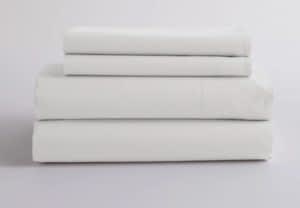
Best Value
Quince Organic Percale Sheet Set
Shop Now
-
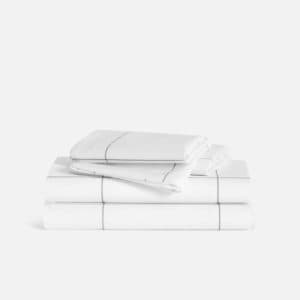
Best Aesthetic Variety
Brooklinen Classic Core Sheet Set
Shop Now
-
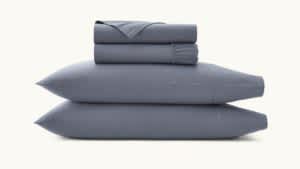
Best Hotel-Style
Boll & Branch Signature Hemmed Sheets
Shop Now
-
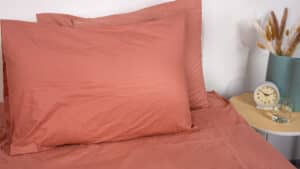
Most Breathable
Silk & Snow Percale Sheets
Shop Now
-
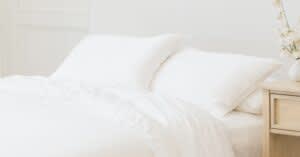
Softest
Cozy Earth Bamboo Sheet Set
Shop Now
-
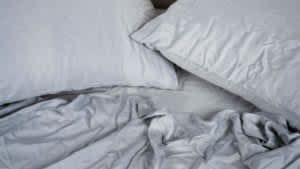
Best Lightweight
Sijo AiryWeight Eucalyptus Sheet Set
Shop Now
-
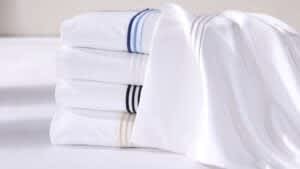
Best Luxury
Pure Parima Triple Luxe Sateen Sheet Set
Shop Now
In-Depth Reviews
Best Overall
Saatva Organic Sateen Sheet Set
Use this link for the most current Saatva discount
Shop Now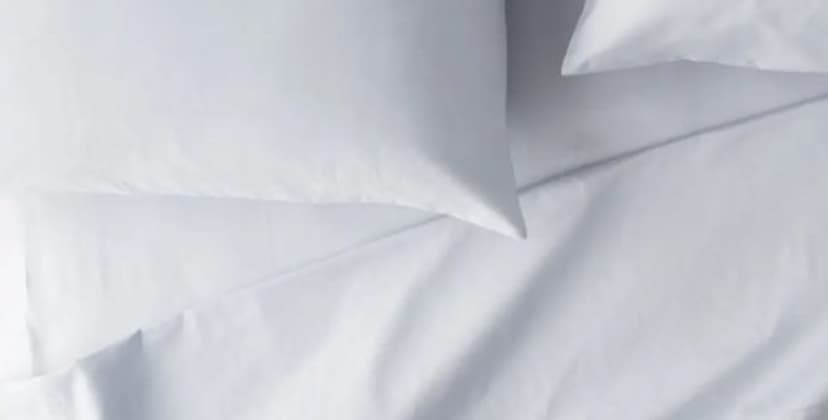
“The Saatva Organic Sateen Sheet Set has a soft, silky feel, so it’s a perfect match for sleepers who like their sheets luxuriously soft. The sheets are also cool to the touch, which is so nice to slip under at the end of a long day.” — Tom Ryan, Head of Product Testing
-
Pros
-
100% cotton design is breathable and soft
-
Silky sateen weave creates an elegant drape
-
Carries GOTS organic certification
-
-
Cons
-
Only three color options available
-
Above-average pricing
-
Price
$245
Material
100% GOTS-certified organic cotton
Weave
Sateen
How It’s Made
The Saatva Organic Sateen Sheet Set is made of 100% cotton with a 300 thread count and smooth sateen weave. The set comes in three colors — white, ivory, and grey — and each set includes a flat sheet, fitted sheet, and a pair of pillowcases. The fitted sheet has a 16-inch pocket depth, so you can use this set on most beds, including thick pillow-tops. If you’re a fan of eco-friendly products, the cotton in these sheets has Global Organic Textile Standard (GOTS) certification to show it meets strict standards for organic sourcing.
How It Performed
The sateen weave gives the Saatva Organic Sateen Sheet Set a luxuriously silky feel, and the cotton has breathable properties that should keep you cool even on warmer nights. One of the benefits of silky sheets, apart from the smooth feel, is that they’re less abrasive. This makes them a great fit for sleepers with skin that’s easily irritated. The sheets are machine-washable in cold water on a gentle cycle, and you can tumble dry them on a low heat setting.
Saatva offers 45-day returns for these sheets, and you’ll also receive a one-year warranty. Shipping is free in the contiguous U.S.
“The Luxome Luxury Sheets are incredibly smooth. They glide over the skin and never feel harsh or abrasive. I’ve used the sheets for two years and love how soft they feel compared to cotton sheets, while also helping me sleep much cooler at night.” – Tom Ryan, Head of Product Testing
-
Pros
-
Viscose derived from bamboo fabrication ensures excellent breathability
-
The sateen weave provides a luxurious, silky-smooth feel
-
Generous pocket depth accommodates mattresses up to 17 inches thick
-
-
Cons
-
Sateen weave may cause fabric to pill quickly
-
Customers pay for return shipping if sheets are defect-free
-
Price
$160
Material
100% Viscose from Bamboo
Weave
Sateen
How It’s Made
The Luxome Luxury Sheet Set is made from a bamboo-derived viscose fabric, worked into a sateen weave. The fabric is naturally smooth and incredibly breathable, while the sateen weave tightens it into a lustrous, silky surface. The fitted sheet has a much larger than standard pocket depth, so it’s able to fit mattresses up to 17 inches thick.
How It Performed
Sheets made from bamboo-derived fabrics are known for their exceptional cooling, and the Luxome Luxury Sheets embody that quality. The sheets drape closely to your body without trapping too much heat, so the set is suitable for year-round use. Our testers gave these sheets high marks on each of our temperature control tests, and our hot-sleeping testers in particular gave their seals of approval.
The bamboo-derived fabric is exceptionally soft to start, and the sateen weave takes that softness to a deeper level. Right out of the packaging, our testers noted the silky-smooth feel of the Luxome Luxury Sheets and couldn’t get enough of their softness. “Gliding” was a common word our testing team used to describe the feeling of touching and laying on the sheets. Our testers with more sensitive skin specifically noted the smoothness of these sheets and that the fabric didn’t rub too harshly as they were lying in bed.
Best Value
Quince Organic Percale Sheet Set
Use this SleepFoundation.org link for the most current discount on Quince sheets
Shop Now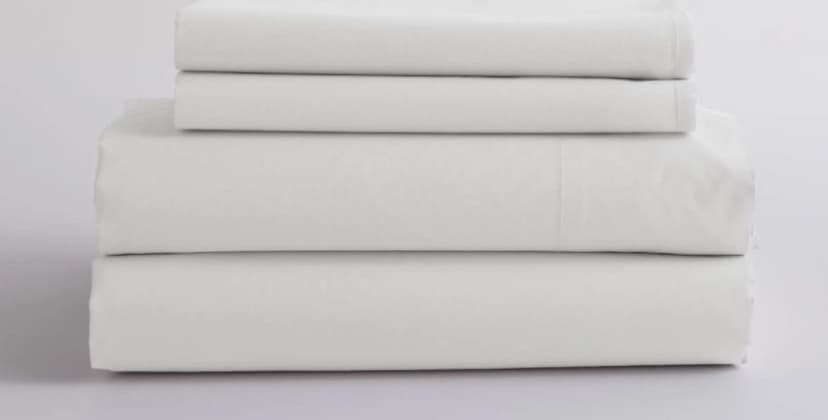
“The Quince Organic Percale Sheet Set is accessibly priced and comes in a ton of different colors. These sheets are a bit softer than some of the other cotton percale sets out there, which is nice for sleepers who want something between silky and crisp.” – Danny Noyed, Senior Product Editor
-
Pros
-
Breathable cotton is ideal for hot sleepers
-
Multiple color options
-
Machine-washable for easy care
-
-
Cons
-
May feel too crisp for sleepers who prefer very silky bedding
-
Price
$100
Material
100% organic extra-long staple cotton
Weave
Percale
How It’s Made
The Quince Organic Percale Sheet Set is well-priced, soft, and comfortable. The sheets are woven from 100% cotton and designed to get softer over time. In addition, the cotton is the long-staple variety, which is known for its durability. The high-quality material paired with the reasonable pricing makes these sheets an exceptional value. You can choose from a wide array of colors, including patterns like stripes.
How It Performed
The Quince Organic Percale Sheets are breathable and have a crisp quality that softens with each wash. The sheets earned high marks during our temperature control tests and met the needs of most of our hot sleepers. The fitted sheet has a 16-inch pocket depth, so you should be able to fit this on most models. Each set comes with a fitted sheet and flat sheet, and one to two pillowcases depending on the size of the set.
Quince offers a generous 365-night sleep trial to try out the sheets. Shipping is free in the contiguous U.S.
“As a visual person, the look of my bed sheets is super important to me – and you can’t beat the dozen options available with the Brooklinen Classic Core Percale Sheets. Personally, I love the crisp, classic look of the windowpane design, although bolder entries like Toffee could really style up a bedroom. I’m also a hot sleeper (any time of year), so I also really appreciate the clean, cool feel of these when I get into bed.” – Colin Simpson, Product Research Manager
-
Pros
-
Available in 12 standard color and pattern options, along with 7 limited edition alternatives.
-
The percale weave’s breathable construction makes this an ideal option for hot sleepers.
-
The 100% long-staple cotton ensures a crisp feel and prolonged durability.
-
-
Cons
-
More colorful dyes have a tendency to run, so these sheets may need a few washes before use.
-
Price
$179
Material
100% Long-Staple Cotton
Weave
Percale
How It’s Made
The Classic Percale collection is composed of long-staple cotton with a crisp hand feel that at first may remind you of a freshly ironed dress shirt, but should soften with subsequent wash cycles. Each component has a mid-level thread count of 270, ensuring both durability and breathable construction that won’t retain too much heat. Brooklinen has one of the more extensive return policies out there, giving you a year to return sheets.
How It Performed
Brooklinen’s Classic Core sheets provide a classic percale sheet experience that’s a few steps upgraded from your typical department store sheets. The percale weave and cotton construction allow for plenty of airflow, helping even our hottest testers sleep comfortably. The sheets are slightly softer than a nice dress shirt when they’re fresh out of the box, and they keep a crisp feel that gets a bit softer over time and washes.
Brooklinen’s sheets got major points from our team when it comes to design. Along with several regular color options, Brooklinen offers multiple limited time colors and patterns throughout the year. The short and long sides of the fitted sheets are clearly labeled, which is always a nice touch. We noticed that some of the heavier dyes have a tendency to run at first, so we recommend washing more colorful sets on their own a few times before use.
Best Hotel-Style
Boll & Branch Signature Hemmed Sheets
Click this link for current Boll & Branch discounts
Shop Now


“I love the Boll & Branch Signature Hemmed Sheets for how soft and smooth they feel — the sateen weave gives the cotton this silk-like quality that’s easy on your skin. They’re also really breathable, which I appreciate as a hot sleeper. Even in the dog days of summer, the sheets feel cool and inviting when I get into bed.” – Brad Nehring, Senior Product Manager
-
Pros
-
Sateen has a matte finish and drapes well for a smooth, finished look.
-
The fitted sheet features a 17 inch pocket for deeper mattresses and is top-stitched to ensure a secure fit.
-
Available in 13 colors and 7 unique patterns.
-
-
Cons
-
The light material may not provide enough warmth during colder months.
-
Sateen is typically more prone to pilling than other weaves.
-
Price
$279
Material
100% Organic Long-Staple Cotton
Weave
Sateen
How It’s Made
The Signature collection is Boll & Branch’s best-selling set. These sheets use a sateen weave, which gives them a soft, light feel that’s appropriate for all seasons. Boll & Branch sheets are crafted from high-quality organic cotton that may cost more than the average sheet set, but their durability makes them a worthwhile investment.
How It Performed
Boll & Branch’s Signature Hemmed Sheets knocked it out of the park across our team’s tests. Although they’re made with a sateen weave, the organic, long-staple cotton used in their construction gives them more breathability and softness. Our team was able to lie comfortably on these sheets, and the hot sleepers on our team were all very satisfied with their ability to stay cool over time. Our testers frequently commented on the softness and smoothness of these sheets, noting that they were on the silkier end of the spectrum when it comes to sateen sheets.
The quality of the organic cotton used in these sheets was clear the moment we opened them, along with the quality of the stitching and small details. We saw little change in these sheets after multiple washes and some at-home trials, suggesting they‘re built to last. Longer cotton staples tend to make for more breathable, durable sheets, and investing in material quality seems to have paid off well here for Boll & Branch.
Most Breathable
Silk & Snow Percale Sheets
Use this link for the most current Silk & Snow discounts
Shop Now


“The Silk & Snow Percale Sheets are both high-quality and budget-friendly — a rare find compared to other bedding we’ve tested. Natural cotton with a percale weave makes for excellent breathability, which is really good for hot sleepers.” – Lauren Fountain, Senior Product Editor
-
Pros
-
Percale feels invitingly crisp
-
Excellent breathability makes the set suitable for hotter climates
-
Available in seven colors rendered from natural dyes
-
-
Cons
-
May not feel soft enough for people who enjoy drapey, silky bedding
-
Fitted sheet is pocket depth is limited compared to other sets
-
Price
$125
Material
100% Cotton
Weave
Percale
How It’s Made
Silk & Snow is best known for its affordably priced products that perform as well as their more expensive competitors. Their Percale Sheets are composed of natural cotton and constructed with a percale weave. This material is particularly well suited to hot sleepers because cotton is naturally breathable and the weave nicely enhances this quality by giving the fabric a crisp finish.
How It Performed
Unlike the more common silky-smooth sateen bedding, percale sheets have an initially crisp feel that gradually softens with use and cleaning. These were no exception. Our team was impressed with their quality and construction, especially given the price-point. The percale weave enhances the cotton’s natural crispness, and those of us who aren’t enamored by the close drape of sateen found the set comfortable and a suitable option for hot sleepers. Exceptionally breathable cotton paired with a relatively low thread count makes the sheets lightweight and minimizes heat retention.
Everything in the set is fully machine-washable with like colors, and Silk & Snow recommends using wool dryer balls in lieu of fabric softener sheets. While the 15-inch pocket depth can accommodate many mattresses, higher-profile mattress owners may need more reach.
“Cozy Earth’s Bamboo Sheet Set checks key boxes for hot sleepers, people with sensitive skin, and those who appreciate silky-smooth bedding. Pocket depth is another strength — the fitted sheet can be used with any mattress measuring up to 20 inches, a range that encompasses every mainstream model sold today.” – Logan Foley, Editorial Director
-
Pros
-
The bamboo-derived viscose is soft, silky-smooth, and breathable
-
The fitted sheet’s deep pockets are compatible with virtually any mattress on the market
-
You can choose from more than a dozen color palettes for your set
-
-
Cons
-
Some of the more striking colors cost more than standard neutrals
-
The set’s expensive sticker price may be a dealbreaker for shoppers with limited budgets
-
Price
$389
Material
100% viscose from bamboo
Weave
Sateen
How It’s Made
The sheets and pillowcases are constructed using viscose derived from bamboo in a sateen weave. As a result, each component feels very soft, smooth, and gentle on your skin. Viscose’s excellent cooling properties also make the set a solid choice for hot sleepers and people who reside in hot or humid climates.
Six sizes are available, including a split king with two fitted sheets for couples with adjustable beds. You can also choose from 14 different color palettes ranging from neutrals and earth tones to more vivid options like Pacific blue and sage. A pocket depth of 20 inches ensures universal compatibility no matter how thick your mattress is.
How It Performed
The Bamboo Sheet Set was popular among our testing team for a number of reasons. We appreciated how silky-smooth each sheet and pillowcase felt against our skin, yet these items also earned favorable ratings during our temperature control tests — we’ve found softness and cooling don’t always go hand in hand. Other performance areas where the set fared well include fit and ease of care.
Although the Bamboo Sheet Set is fairly pricey, Cozy Earth offers free ground shipping for all U.S. orders and reasonable rates for international deliveries. The company allows returns and exchanges within 100 nights of receipt. If you’re satisfied with your set, your purchase is further backed by a 10-year warranty against manufacturing defects.
Best Lightweight
Sijo AiryWeight Eucalyptus Sheet Set
Use this link for the most current Sijo discounts
Shop Now


“As a hot sleeper, I appreciate how breathable the Sijo AiryWeight Eucalyptus Sheets feel — there’s this nice burst of cooling when I get into bed, and I stay comfortable all night long. The softness and smoothness is also hard to beat.” – Colin Simpson, Product Research Manager
-
Pros
-
The eucalyptus-derived Tencel fabric is exceptionally soft, breathable, and gentle on your skin
-
You can forgo the flat sheet and save money on your purchase
-
The set is available in six sizes and a wide range of colors
-
-
Cons
-
This set isn’t ideal if you prefer crisp, lightweight bedding
-
Your sleep trial is limited to one week — much shorter than average
-
Price
$165
Material
100% Tencel lyocell
Weave
Sateen
How It’s Made
Tencel is derived from eucalyptus and retains the natural cooling properties of its botanical source. This sheet set holds a certification from the Forest Stewardship Council, indicating the eucalyptus trees used to produce the fabric are sustainably grown and cultivated. Tencel is also luxuriously soft, a quality further enhanced by the sateen weave. The sheets and pillowcases in this collection have a luxuriously silky-smooth hand-feel.
Standard sets include a flat sheet, fitted sheet, and one to two pillowcases. You can choose to omit the flat sheet and cut down the cost of your purchase. The fitted sheet has a pocket depth of 16 inches, making the set compatible with most mattresses sold today. Eight color palettes and six sizes are available.
How It Performed
Hot sleepers on our testing team were greatly impressed with the AiryWeight Eucalyptus Sheet Set, even when we cranked up the thermostat. Each item feels cool to the touch and the bedding didn’t retain much heat despite the sateen weave, which often reduces breathability.
The sateen weave elevates the softness and overall comfort of these sheets and pillowcases. At the same time, the Tencel fabrication makes each component fairly durable and resistant to pilling. We also gave the set high marks for fit and ease of cleaning.
The AiryWeight Eucalyptus Sheet Set is affordably priced and Sijo offers reasonable flat-rate shipping for U.S. customers. The company’s sleep trial is somewhat short, spanning only seven nights, but you’ll receive a full refund if you decide to return the sheets during this period.
Best Luxury
Pure Parima Triple Luxe Sateen Sheet Set
Use this link for the most current Pure Parima discounts
Shop Now


“OK, so these are pricey, but boy are they ever opulent. They are cucumber cool, incredibly breathable, and they have a smoothness and sheen that’s undeniable. I’ve been machine-washing the same set for years, and they’ve held up remarkably well. They’re certified Egyptian cotton which makes them extra soft (and more so with age), you can usually find them on sale, and the color options are sophisticated.” – Mary Fenton, Head of Product Content
-
Pros
-
The Egyptian cotton construction provides an exceptionally breathable sheet that holds up well, even in the hotter months.
-
These sheets come with standout softness and smoothness from the start, providing a luxurious feel that only softens with time.
-
-
Cons
-
The price-point for these sheets reflects the quality of materials used in their construction, making them less accessible compared to other cotton sateen sheet sets.
-
Price
$325
Material
100% Egyptian Cotton
Weave
Sateen
How It’s Made
The Pure Parima Triple Luxe Sateen Hotel sheets are made with some of the highest quality materials, constructed entirely of Egyptian cotton in a luxurious sateen weave. Egyptian cotton is a variety of cotton known for its exceptional quality, durability, and breathability when used in textiles.
How It Performed
The materials used in the Pure Parima Triple Luxe Sateen Hotel sheets are very high-quality, a fact that shone through in all aspects of our testing. Our team found these sheets incredibly soft and smooth, and they were a crowd favorite during the testing process. The design shows careful attention to detail and subtle luxe touches. The sheets showed no signs of wear after washing and home testing trials, and our team expects them to last much longer than other sateen sheets with proper care.
These sheets aced all of our temperature control tests, staying nice and cool despite the environment. Every one of our hot-sleeping testers was very satisfied with these sheets and noted that they’d be great for year-round use. These sheets are well-stitched and thoughtfully constructed, making full use of the Egyptian cotton fabric and drawing out some of its best qualities.
Best Sheets of 2024 Video
How We Test: Rigor, Data, and Sleeper Feedback
We know every sleeper has different preferences when it comes to finding the right sheet set. This is the basis for our objective rating system, which allows us to take a thorough look at each sleep product we test and pinpoint its pros and cons.
Sheets play a major role in your overall sleep quality, so everyone should choose bedding that meets their personal criteria for comfort and coziness. Our team evaluates sheet sets in our Seattle-based Test Lab using a four-step process. This system is detailed below.
Construction analysis: We kick off our tests by analyzing sheet construction, noting specifications such as material, weave, and thread count. This cursory examination is key to identifying the set’s temperature control capabilities, durability, and overall quality.
Product testing: During the hands-on phase of our testing process, we’ll take turns lying on a mattress with the flat sheet, fitted sheet, and pillowcases in place. This allows us to gauge how secure the fitted sheet feels, whether the bedding sleeps cool or insulates, and how crisp or smooth the fabric feels.
Field testing: Our field testers use different sheets in their own homes. They’ll test each set over the course of several weeks, making daily notes that help us understand how the bedding performs over time.
User testing: We draw from customer surveys and third-party reviews to see how sheet set owners feel about their purchases. This feedback lets us know if our initial ratings align with real-world consumer experiences.
So What’s in a Sheet?
There’s lots to unravel when it comes to deciphering sheet fact versus fiction, so we’re going to start at the source to help you discern the marketing babble from the sheet certitude.
Living in a Material World
Let’s talk fabrics.
Sheets are made from fabric. Fabrics can be made from a number of different plant, animal, and synthetic fibers. Those fibers are processed in a number of different ways to turn them into thread. Those threads are either knit (one continuously interloping thread) or woven (multiple threads crossing over/under one another). Knits tend to be stretchier and not wrinkle as much (think leggings, T-shirts, fleece) as weaves, which are more durable and prone to wrinkling (corduroy, flannel, denim).
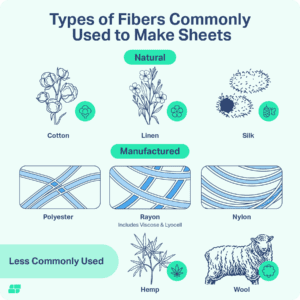
To further complicate matters, there are not only myriad species of the same plant (Egyptian or pima cotton, anyone?) but also multiple weaves and knits of said fibers. Cotton can have a percale, sateen, or twill weave, to name a few, but it can also be knit into jersey. And don’t get me started on staple lengths!
Ok, twist my arm.
Cotton and other natural fiber lengths are measured in staples. Generally speaking, the longer the staple, the softer and stronger the weave. Think about it like braiding hair. If you have a lot of layers, the hair will stick out everywhere versus if you have really really long hair it’s like a really strong rope. These sheets are generally pricier (looking at you again, Egyptian Cotton grown in Egypt) but they’ll typically have a longer shelf life given their higher quality.
While cotton and cotton blends are still the most popular choice in the U.S., representing about 80% of sheets on the market today, consumer choice often changes with the wind. Inflation, sustainability, and “performance” can all impact preferences and purchase decisions.
Outside of cotton, sheets are often made from linen (flax), silk, polyester (petroleum), and microfiber (polyester, nylon, acrylic), as well as lyocell, rayon, and viscose (tree pulp, including bamboo). Each has their pros and cons, benefits and drawbacks. And all of those all come down to what feels right to you: breathability, warmth, texture, lifespan, hue – linen will always be John’s gold standard, but Jane couldn’t imagine a world without flannel.
“From my experience, linen is the most breathable, but it’s also on the coarse side,” says Jeremy Klein, Senior Product Testing Manager. “On first touch, it’s not the most comfortable, but it gets softer the more you use it. For me, it’s a worthy sacrifice for its breathability. And I love its natural look. It doesn’t take dye well, so it only comes in more neutral tones.”
Your bedroom climate can affect your bedding choices as well. “I slept on flannel sheets growing up in Minnesota,” says Jackson Lindeke, Executive Product Director. “They are a classic seasonal sheet type that you throw on from October to April. It’s a thicker material. There’s a reason a flannel shirt is this cozy experience, right? It’s the same with flannel sheets.”
Looming Over You: Weaves
The majority of sheets are woven. Some, like jersey, are knit. Our resident certified textiles expert, Lauren Fountain, breaks down the main weaves you’ll find in sheets. A sateen weave is going to have a minimum ratio of four threads to one, but it can go up to 11:1, she explains. A percale weave (or plain weave), is a 1:1 ratio. So you’re going to have a slightly higher thread count for a sateen over a percale simply because of weave structure. At the same time, percale is crisper, holds its shape better, and has more structure. Sateen is more flowy and will lay closer to your body.
“It’s what makes sateen sheets really soft right out of the package and gives them luster – there are more fibers. It also makes them just a little bit warmer than percale because air gets trapped in all those pockets,” Lauren says.
When we talk about thread counts, we’re referring to the number of threads that are woven into a square inch of fabric – basically how tight a weave is. So yes, while 2,400 thread count sheets do exist, they’re generally comprised of thin (micro) fibers with multiple plies (threads wrapped around each other before they’re woven together) to fit all those threads in, making them sound extra fancy, while in reality, lowering their quality.
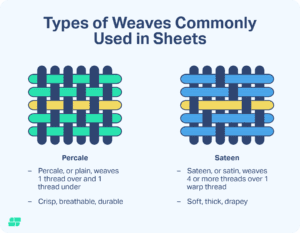
“Basically the whole idea with marketing is that a higher thread count means a better sheet, right?” says Senior Product Editor Danny Noyed. “That’s what’s been drilled into people’s heads, but that’s only true to a point. If you see anything above 600, it’s not going to launder itself, make you dinner, or do anything extra special for you. The quality just isn’t going to improve past that point,” he says.
Weaves aside, it really just comes down to how you sleep best. If breathability is your No. 1 priority, go with a lower thread count, being careful not to sacrifice durability. Are you going to need to machine-wash and dry your kids’ sheets? Care will make a big impact on how long they last, so if durability is your thing, don’t go with something that’s air-dry only like most silk sheets.
So, to recap: The higher the thread count, the higher the density of fabric, which means a warmer and more durable sheet. But that’s not always the case, it also depends on the fabric, and your own sleep preferences are really all that matters.
Thread Count
Thread count matters more for certain types of materials than others. When considering different kinds of sheets, look for counts in the following ranges while remembering that thread count isn’t the be-all, end-all.
Material:
Bamboo-Derived Rayon: 200 to 300
Supima Cotton: 200 to 400
Egyptian Cotton: 200 to 400
Linen: 80 to 200 (although thread count is rarely listed)
Weave:
Percale Weave: 200 to 400
Sateen Weave: 300 to 600
Some materials use weight, not thread count, to describe fabric density. As with thread count, these aren’t necessarily the most important gauge for quality.
Silk: 17-22 pounds per 100 yards (momme)
Microfiber: 90-120 grams per square meter (GSM)
Flannel: 170 or more GSM
Jersey: 10 or more ounces per yard
Accountable Threads
Let’s wrap this party up with a few last considerations. We’ve touched on fibers and fabrics, weaves and thread counts. But what of aesthetics, fit, and sustainability?
“For some people, knowing that their sheets are certified organic or processed mechanically rather than chemically is something they’re willing to pay more for – having that peace of mind,” says Lauren. “A lot of what might seem eco-friendly is just greenwashing. Yes, it’s true that bamboo can grow in a lot of places that cotton can’t and it can grow back really quickly, but it is also a very, very chemically intensive process that it goes through, and by the time it hits your bed, there’s zero bamboo left in the material,” says Lauren.
She’s referring to viscose, which is a type of fabric, but it’s also the name for the process of turning cellulose-based fibers into fabric. So yes, that sheet started as bamboo, beech, or eucalyptus, but it’s been so chemically processed that it’s now semisynthetic.
If you’re trying to make the most eco-friendly choice, it can be very confusing to wade through the massive amount of greenwashing that takes place in the bedding industry. To separate the flashy marketing ploys from the credible claims, keep your eyes peeled for third party certifications. Global Organic Textile Standard (GOTS) and OEKO-TEX are the two main ones to look for when shopping for bedding.
However, maybe it’s not the material cycle but fit and design that’s the dealbreaker for you. For example, if your fitted sheet pockets aren’t deep enough, they’re going to pop off, and that’s an annoyance that’s not additive to sleep. It helps to know what to look for, says Jackson. “I like to look at how the elastic is attached under the pockets of the fitted sheet, and whether there’s extra elastic or reinforcements around the corners. It’s also nice to have a visual cue for orientation, or which way is short and long,” he says.
And say you want both ends of your pillow to be covered by a pillowcase. You’re going to want to make sure yours have envelope enclosures on them. And if your bedroom is also your TikTok sleepfluencer studio, you should probably have accent colors or patterns that are on trend – cottons and microfibers will be your best bets for aesthetic variety.
I’d be going out on a loom limb to say that understanding what you’re buying when you pick out sheets is simple, but if you’ve made it this far, hopefully you now have an inside line on what many of us on the Test Lab team consider to be bedding’s best layers.
For more on specific sheet sets, check out the guides below. If you’re ready to cozy up to the world of pillows, this link is for you.
Your Complete Guide to Sheets
By Feel
By Weave
Frequently Asked Questions
What does thread count mean?
This measurement refers to the number of individual horizontal and vertical threads within 1 square inch of the material. The higher the thread count, the denser and heavier the material will feel.
Thread count is often cited to measure durability and overall quality, but this is somewhat misleading because the quality of the yarn is more important. A sheet made of high-quality material with a low thread count could easily perform better and last longer than a sheet of lesser material quality with a higher thread count.
Furthermore, manufacturers frequently inflate thread counts to make their sheets seem superior to their competitors’ products. This is especially true for sheets with more than one ply (an individual layer of fabric). For example, if one ply of a given material has a thread count of 300, then a two-ply section of the same fabric might be listed with a thread count of 600 – even though adding a second layer does little to make the sheet heavier or longer-lasting.
The bottom line: Pay attention to thread count, as it does affect how heavy and breathable the sheets can feel. However, take manufacturer assertions with a grain of salt – especially if the thread count exceeds 600. Also remember that thread count does not apply to certain fabrics. Microfiber and flannel are often measured using grams per square meter, silk is measured in momme, and jersey is measured in ounces per yard. Thread counts are not normally listed for linen sheet sets.
How often should you wash your sheets?
You should always consult the care instructions for your sheet set to determine how frequently the items need to be washed and dried. These instructions depend on the material composition and, to a lesser extent, the weave.
Keep in mind that each wash cycle for your sheets will contribute to overall wear and tear and shorten the lifespan of your bedding. Delicate materials such as silk and linen are more likely to deteriorate with frequent cleaning. Be sure to follow specific care instructions regarding factors like water temperature and tumble dry setting.
That said, most people find that cleaning their sheets every 1 to 2 weeks is sufficient for keeping their sleep surface hygienic. Regular washing reduces the buildup of body moisture and dead skin particles to keep the material smelling fresh, while staving off dust and other allergens. You may want to wash your bedding more frequently if small children or pets sleep with you on a regular basis.
What should I expect to pay for luxury sheets?
You should expect to pay at least $125 for a luxury sheet set. Discounts and promotions can help make luxury sheets more affordable, but at the end of the day, quality materials and craftsmanship carry a higher price tag. While luxury sheets don’t have to cost an arm and a leg, they also won’t be found in the bargain bin. Many of the best bedding brands offer sheets at an affordable price without skimping on high-quality construction or performance.
Are Egyptian cotton sheets worth it?
Egyptian cotton sheets are worth their premium price if you want to splurge for the material that is typically the most luxurious and durable. Egyptian cotton has an excellent reputation and a trustworthy track record.
That said, you don’t have to break the bank on Egyptian cotton to get high-quality sheets that are soft and long-lasting. Great value can be found with other types of fabrics, so while Egyptian cotton is a worthy consideration, it’s not necessarily the top choice for every shopper.
What type of sheets are hotel sheets?
“Hotel sheets” is a fairly broad descriptor. It encompasses any sheets likely to be found in a high-end hotel, which tend to be durable cotton sheets, whether in silky-smooth sateen or a crisp percale weave. One thing that all good hotel sheets have in common is a soft, welcoming feel that invites guests to relax and let themselves be pampered.
Luxury hotels strive to offer their guests the ultimate comfort, yet the high turnover rate also means that bedding must be easy to care for and resistant to repeated washes. These qualities are typically found in sheets with a higher thread count, made with better-quality materials. Long-staple cotton is a popular choice due to its soft, breathable feel and its ability to resist pilling and tearing.
What types of sheets are produced most sustainably?
Sheets produced with natural materials like cotton and linen are often the most sustainably produced, and semi-synthetic materials like Tencel and bamboo-rayon also frequently involve sustainable production practices. Some fabrics carry certifications from third-party organizations that validate that the material was produced according to organic, chemical-free, or other standards meant to protect the environment and human health.
How long do sheets last?
As a general rule, sheets last for around 2 years. Higher-quality and heavier-duty sheets can last longer, and poorly made sheets with low-end materials will have a shorter useful life.
How long the sheets last will also depend on how you use them. If you rotate using two sheet sets, both sets will last longer. In addition, it’s critical to follow the manufacturer’s instructions for laundering sheets to prevent premature damage. Keeping food and drinks out of the bedroom can also avoid harmful spills and stains.
Still have questions?
Our product experts have extensive experience testing just about every sleep product on the market.
Send an email to [email protected] with your questions and we’ll help you find exactly what you’re looking for.








